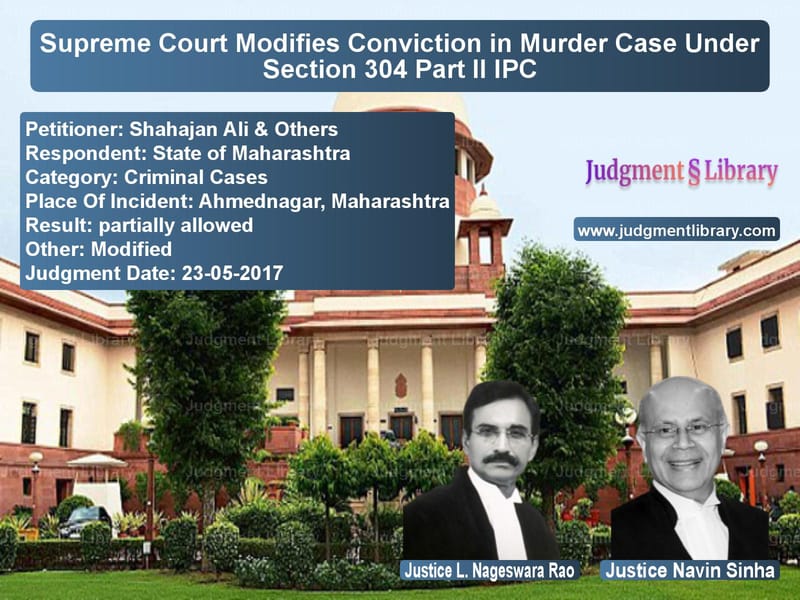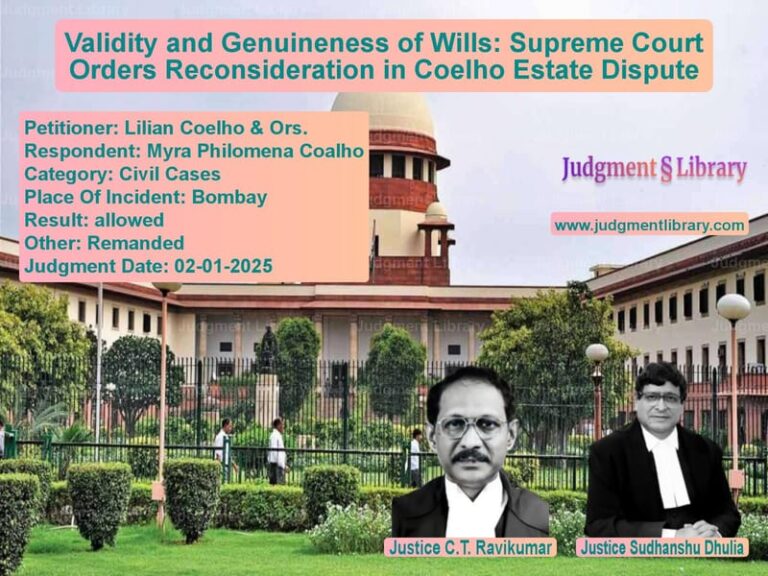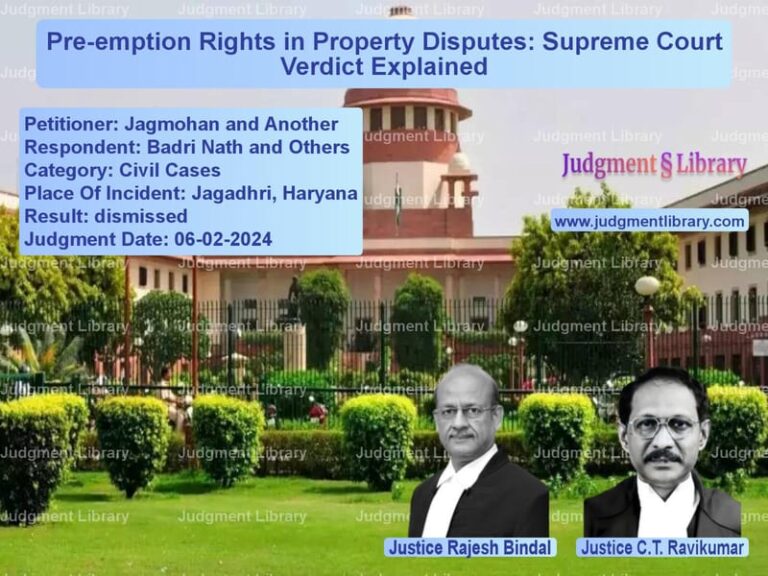Supreme Court Modifies Conviction in Murder Case Under Section 304 Part II IPC
The Supreme Court of India, in its judgment dated May 23, 2017, in the case of Shahajan Ali & Others vs. State of Maharashtra, modified the convictions of the appellants from Section 302 of the Indian Penal Code (IPC) (murder) to Section 304 Part II IPC (culpable homicide not amounting to murder). The Court ruled that the incident was a result of a sudden altercation rather than a premeditated act, thereby reducing the severity of the charges. The appellants, who had already served substantial jail time, were sentenced to the period already undergone and ordered to be released immediately.
Background of the Case
The case involved the fatal stabbing of one Sarfraj Akbar Syyed on January 11, 2010, in Ahmednagar, Maharashtra. The prosecution alleged that the deceased was attacked at a roadside dhaba due to business rivalry. An FIR was registered based on the testimony of eyewitnesses, including PW-3 (Sadiq Hussain Majloom Jafri) and PW-4 (Jafar Ali), who claimed to have seen the accused assaulting the victim. The trial court convicted the main accused, Sikandar Ali (A-1), under Section 302 IPC and sentenced him to life imprisonment, while acquitting the co-accused (A-2 to A-4). However, on appeal, the Bombay High Court reversed the acquittals and convicted all four accused under Section 302 IPC, sentencing them to life imprisonment. The case was then taken to the Supreme Court.
Legal Issues Examined
The Supreme Court considered several important legal questions:
- Whether the attack was premeditated or a result of a sudden quarrel.
- Whether the High Court was justified in reversing the acquittals and convicting all accused under Section 302 IPC.
- Whether the common intention of all accused to commit murder was established.
- Whether the case fell under the exceptions to Section 300 IPC, warranting a lesser charge under Section 304 Part II IPC.
Arguments by the Appellants
- The appellants argued that the incident was a spontaneous fight and not a pre-planned murder.
- They contended that there was no strong evidence to prove a common intention among all accused to commit murder.
- They highlighted discrepancies in the prosecution’s case and inconsistencies in witness statements.
- They pointed out that the trial court had acquitted A-2 to A-4 based on the same evidence that the High Court relied upon to convict them.
Arguments by the Respondent (State of Maharashtra)
- The prosecution argued that the evidence clearly pointed to a planned attack on the deceased.
- They maintained that all accused had participated in the assault, making them equally liable under the principle of common intention.
- They emphasized the credibility of the eyewitnesses, who consistently testified about the role of each accused in the crime.
Supreme Court’s Observations
The Supreme Court carefully analyzed the evidence and the findings of the lower courts. The key observations were:
- The attack occurred after a heated argument between the deceased and the accused at the dhaba.
- The prosecution did not establish any prior planning or conspiracy to commit murder.
- The role of A-2 to A-4 was limited to restraining the deceased while A-1 stabbed him, suggesting their involvement was not with the intention of causing death.
- The case fell under Exception 4 of Section 300 IPC, which applies when a person commits homicide without premeditation in a sudden fight.
Final Judgment
The Supreme Court modified the conviction as follows:
- A-1 (Sikandar Ali) was convicted under Section 304 Part II IPC instead of Section 302 IPC.
- A-2 to A-4 (Shahajan Ali and others) were also convicted under Section 304 Part II IPC.
- Since the appellants had already undergone significant imprisonment (A-1 for seven years and A-2 to A-4 for four years), they were sentenced to the period already served.
- The Supreme Court ordered their immediate release.
Implications of the Judgment
The ruling in this case has significant implications for criminal law and sentencing:
- Reaffirmation of the Principles of Culpable Homicide: The judgment reinforces that not all homicides qualify as murder and that courts must assess intent and circumstances before sentencing.
- Protection Against Arbitrary Convictions: The Supreme Court highlighted the need for appellate courts to exercise caution when overturning acquittals.
- Clarification on Common Intention: The ruling clarifies that mere presence at the crime scene does not automatically establish common intention.
- Recognition of Sudden Quarrels: This judgment is a crucial reference for cases where homicide results from spontaneous fights rather than premeditated planning.
Conclusion
The Supreme Court’s judgment in Shahajan Ali & Others vs. State of Maharashtra is a landmark ruling that underscores the importance of distinguishing between murder and culpable homicide. By modifying the convictions from Section 302 IPC to Section 304 Part II IPC, the Court ensured a fair application of legal principles, emphasizing the significance of intent, provocation, and circumstances in determining criminal liability. This case serves as an important precedent for future judgments in similar criminal matters.
Don’t miss out on the full details! Download the complete judgment in PDF format below and gain valuable insights instantly!
Download Judgment: Shahajan Ali & Other vs State of Maharashtra Supreme Court of India Judgment Dated 23-05-2017.pdf
Direct Downlaod Judgment: Direct downlaod this Judgment
See all petitions in Murder Cases
See all petitions in Attempt to Murder Cases
See all petitions in Custodial Deaths and Police Misconduct
See all petitions in Judgment by L. Nageswara Rao
See all petitions in Judgment by Navin Sinha
See all petitions in partially allowed
See all petitions in Modified
See all petitions in supreme court of India judgments May 2017
See all petitions in 2017 judgments
See all posts in Criminal Cases Category
See all allowed petitions in Criminal Cases Category
See all Dismissed petitions in Criminal Cases Category
See all partially allowed petitions in Criminal Cases Category







